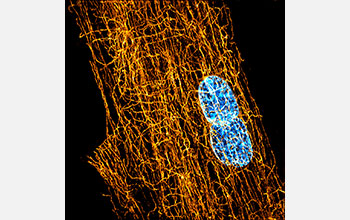Multimedia Gallery
Cage of microtubules surrounds nucleus in a human heart cell
A cage of microtubules surrounds the nucleus in a human heart cell.
More about this image
Researchers at the Perelman School of Medicine at the University of Pennsylvania have found that changes in cellular struts called microtubules (MT) can affect the stiffness of diseased human heart muscle cells, and that reversing these modifications can lessen the stiffness and improve the beating strength of these cells isolated from transplant patients with heart failure.
"These findings provide compelling evidence from human samples for a new therapeutic target for heart disease," said Ben Prosser, an assistant professor of physiology at Penn.
The Penn investigators aim to develop therapies that seek out the damaged MTs to reverse their harmful influence.
This research was funded in part by a grant from the National Science Foundation's Science and Technology Center (CMMI 1548571).
Read more about this research in the Penn news story New Target for Treating Heart Failure Identified by Penn Medicine Researchers. (Date image taken: 2018; date originally posted to NSF Multimedia Gallery: Aug. 23, 2018)
Credit: Ben Prosser Lab, Perelman School of Medicine, University of Pennsylvania
Images and other media in the National Science Foundation Multimedia Gallery are available for use in print and electronic material by NSF employees, members of the media, university staff, teachers and the general public. All media in the gallery are intended for personal, educational and nonprofit/non-commercial use only.
Images credited to the National Science Foundation, a federal agency, are in the public domain. The images were created by employees of the United States Government as part of their official duties or prepared by contractors as "works for hire" for NSF. You may freely use NSF-credited images and, at your discretion, credit NSF with a "Courtesy: National Science Foundation" notation.
Additional information about general usage can be found in Conditions.
Also Available:
Download the high-resolution JPG version of the image. (1.4 MB)
Use your mouse to right-click (Mac users may need to Ctrl-click) the link above and choose the option that will save the file or target to your computer.

